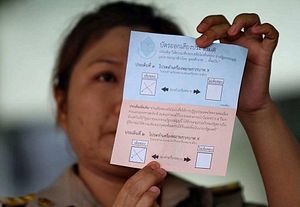The long-awaited vote on Thailand’s draft constitution came on August 7. The unofficial result from the Election Commission (EC) showed that 61.4 percent of Thais had voted for the draft constitution, while 37.9 percent rejected it. Thailand’s major political parties and critics of the government had said that the draft constitution could ensure that the military retains considerable influence over the country’s political system. To that end, the win has dealt a blow to the Shinawatra family and the Pheu Thai Party. The acting head of the Pheu Thai Party, Pol Lt. Gen. Viroj Pao-in, said that Thais might have voted pragmatically as they wanted a general election to be held quickly.
The referendum has been described as a litmus test for the Thai junta’s popularity. With the win, the junta, otherwise known as National Council for Peace and Order (NCPO), would now feel confident about rolling out their plans for the transitional period. At issue is whether NCPO will deliver its promise of calling for an election in 2017. In September 2015, government officials had mentioned that elections would be scheduled in mid-2017 according to the “6-4-6-4 roadmap to democracy.” Under the roadmap, the government was given six months to draft a new constitution, four months to hold a referendum on it, six months to draft laws to support the constitution, and four months to campaign ahead of the election. Given that the draft constitution has passed the referendum, elections should go ahead as planned.
However, Thailand would have a “guided” democracy even if elections are held. Under the constitution, the Senate of 250 members will be fully appointed by the military, with six ex-officio reserve seats allotted for senior representatives from the military and police. There is also a provision allowing for a non-elected individual to be appointed as prime minister in the event of a political deadlock. Essentially, the constitution was drafted to enshrine the NCPO in domestic politics during the transitional period.
The NCPO’s quest for continued control stems from the custodial role it has once again hoisted upon itself, this time in navigating the country through the compounded challenge of national corruption linked to ousted Prime Minister Thaksin Shinawatra and the succession of ailing King Bhumibol Adulyadej, which lies at the heart of the NCPO agenda of conducting “economic, social, and political reform.”
The 2014 coup and the rise of the NCPO signals an ongoing jostling for primacy as King Bhumibol’s reign must soon come to its natural end. In what was described as the “network monarchy,” there are multiple circles of players and influence surrounding the Thai royal family, often times with competing agendas. Officially, Prince Maha Vajiralongkorn was designated as the crown prince and heir-apparent by King Bhumibol in 1972.
However, suspecting that Thaksin still has close ties with the crown prince—never mind that his personal brand has come into question—Prime Minister Prayut Chan-o-cha and his military coterie intervened to stave off any possibility of Thaksin or his proxies returning to power. Their fear is that the royal succession of Prince Vajiralongkorn would roll back the steps taken since 2006 to put a stop to the political crisis the Thaksin government engendered.
Receiving a “yes” vote on the draft constitution seems to be an ideal situation for the Prayut administration. Its goal is a social contract with the Thai public that gives the NCPO license to go about the difficult business of preserving long-term stability ripe for democracy within Thailand’s complex polity. This may include ensuring that the Privy Council executes its legal mandate to emplace its president, Prem Tinlasunonda, as temporary regent upon the King’s death. Prem could then revise the succession law to allow the Privy Council to name Princess Sirindhorn, who is deemed to be a more competent alternative. Otherwise, Prem can also call for a period of mourning of unspecified duration before naming a successor to parliament.
Nevertheless, NCPO’s mandate from the referendum must not lead to complacency as the bargain with the Thai public is tangential. The risk of dissent continues to lie ahead, especially if there is no sign of progress. To reduce the risk of dissent, the simplest and most effective action would be to communicate tangible steps toward the next democratic election. Although originally slated for 2017, the reality is that elections may return much later given the number of legal and constitutional changes that would have to take place. The point is to place milestones within sight. The Thai polity may be willing to stretch its tolerance just a little more if Prayut’s authoritarianism lends itself to a little more accountability.
It is also good for market signalling. Otherwise, foreign investment will eventually seep from the country since military governments cannot be expected to be competent in long-term economic planning. Whatever sound economic fundamentals that Thailand still enjoys will soon wear out, compounding the country’s political plummet. For now, it still remains in the hands of the Prayut administration to avoid this fate.
Eugene Mark is a Senior Analyst with Singapore’s S. Rajaratnam School of International Studies (RSIS). Graham Ong-Webb is a Research Fellow with RSIS.

































